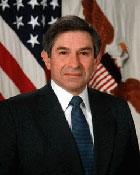Paul Wolfowitz

(1943 - )
On February 5, 2001, President Bush announced his
intention to nominate Dr. Paul Wolfowitz to be Deputy Secretary of Defense.
He was unanimously confirmed by the Senate on Feb. 28th and sworn in
March 2, 2001 as the 28th Deputy Secretary of Defense. This is Dr. Wolfowitz's
third tour of duty in the Pentagon.
For the last seven years, Dr. Wolfowitz has served
as Dean and Professor of International Relations at the Paul H. Nitze
School of Advanced International Studies (SAIS) of The Johns Hopkins
University. SAIS is widely regarded as one of the world's leading graduate
schools of international relations with 750 students, studying on campuses
in Washington, D.C.; Nanjing, China; and Bologna, Italy. As Dean, he
led a successful capital campaign that raised more than $75 million
and doubled the school's endowment. Also under his leadership, the curriculum
and facilities were modernized and new faculty and programs were added
to shift the school's focus from the Cold War to the era of globalization.
From 1989 to 1993, Dr. Wolfowitz served as Under Secretary
of Defense for Policy in charge of the 700-person defense policy team
that was responsible to Secretary Dick Cheney for matters concerning
strategy, plans, and policy. During this period Secretary Wolfowitz
and his staff had major responsibilities for the reshaping of strategy
and force posture at the end of the Cold War.
Under his leadership, the Policy Staff played a major
role in reviewing war plans for the Gulf War, and developing and executing
plans that successfully raised more than $50 billion in Allied financial
support for the war and prevented Iraq from opening a second front with
Israel. Other key initiatives included the development of the Regional
Defense Strategy, the Base Force, and two presidential nuclear initiatives
that led to the elimination of tens of thousands of U.S. and Soviet
nuclear weapons.
During the Reagan administration, Dr. Wolfowitz served
for three years as U.S. Ambassador to Indonesia - the fourth largest
country in the world and the largest in the Moslem world. There he earned
a reputation as a highly popular and effective Ambassador, a tough negotiator
on behalf of American intellectual property owners, and a public advocate
of political openness and democratic values. During his tenure, Embassy
Jakarta was cited as one of the four best-managed embassies inspected
in 1988.
Prior to that posting, he served three and a half years
as Assistant Secretary of State for East Asian and Pacific Affairs,
where he was in charge of U.S. relations with more than twenty countries.
In addition to contributing to substantial improvements in U.S. relations
with Japan and China, Assistant Secretary Wolfowitz played a central
role in coordinating the U.S. policy toward the Philippines that supported
a peaceful transition from the dictatorship of Ferdinand Marcos to democracy.
Dr. Wolfowitz's previous government service included:
- Two years as head of the State Department's Policy Planning Staff
(1981-82):
- An earlier Pentagon tour as Deputy Assistant Secretary of Defense
for Regional Programs (1977-80), where he helped create the force
that later became the United States Central Command and initiated
the Maritime Pre-positioning Ships, the backbone of the initial
U.S. deployment twelve years later in Operation Desert Shield;
- Four years (1973-77) in the Arms Control and Disarmament Agency,
working on the Strategic Arms Limitation Talks and a number of nuclear
nonproliferation issues; and
A year as a Management Intern at the Bureau of the Budget (1966-67).
- Dr. Wolfowitz taught previously at Yale (1970-73) and Johns Hopkins
(1981). In 1993, he was the George F. Kennan Professor of National
Security Strategy at the National War College. He has written widely
on the subject of national strategy and foreign policy and was a
member of the advisory boards of the journals Foreign Affairs and
National Interest .
Among his many awards for public service are:
- The Presidential Citizen's Medal,
- The Department of Defense's Distinguished Public Service Medal,
- The Department of State's Distinguished Honor Award,
- The Department of Defense's Distinguished Civilian Service Medal,
and
- The Arms Control and Disarmament Agency's Distinguished Honor
Award.
In January 2005 Wolfowitz
was nominated to be President of the World
Bank and he assumed that post in June.
Wolfowitz received his A.B. degree in mathematics and
chemistry from Cornell University in 1965, and earned an M.A. and Ph.D.
from the University of Chicago in political science and economics. He
was born in New York on Dec. 22, 1943.
Sources: Defense
Link and Johns
Hopkins |